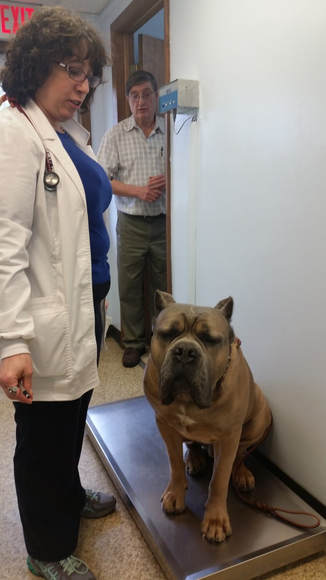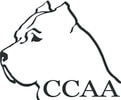AKC CANINE HEALTH FOUNDATION +
chic + HEALTH TESTING

Health testing is an important tool used by responsible breeders to decrease the chances of health problems in their puppies. Being living creatures, there is no way to absolutely ensure no health problems will ever develop, but testing provides both the breeder and the buyer valuable information.
Though many veterinarians provide excellent care to their charges, not all are qualified to evaluate the nuances of this particular breed’s potential health issues, especially as far as the reproductive implications are concerned. This is why in testing potential breeding dogs we turn to the gold standard of evaluation: the Orthopedic Foundation for Animals (OFA) and PennHIP.
The CCAA is enrolled in the Canine Health Information Center (CHIC) program. Dogs meeting these basic health screening requirements will be issued Canine Health Information Center (CHIC) numbers:
The Canine Health Information Center, also known as CHIC, is a centralized canine health database sponsored by the Orthopedic Foundation for Animals (OFA). CHIC, working with participating parent clubs, provides a resource for breeders and owners of purebred dogs to research and maintain information on the health issues prevalent in specific breeds by establishing a recommended protocol for breed specific health screening and recognizing dogs tested in accordance with that protocol. Learn more here: http://www.caninehealthinfo.org.
The AKC Canine Health Foundation (CHF) is dedicated to advancing the health of all dogs and their owners by funding sound, scientific research and supporting the dissemination of health information to prevent, treat, and cure canine disease. Learn more here: http://www.akcchf.org.
The CCAA also urges anyone with a Cane Corso that suffers from seizures of which the cause is unknown to contact and submit samples to The Canine Epilepsy Project. This foundation is supported by grants from the AKC Canine Health Foundation (CHF), National Institutes of Health (NIH), individual breed clubs and private donations.
Though many veterinarians provide excellent care to their charges, not all are qualified to evaluate the nuances of this particular breed’s potential health issues, especially as far as the reproductive implications are concerned. This is why in testing potential breeding dogs we turn to the gold standard of evaluation: the Orthopedic Foundation for Animals (OFA) and PennHIP.
The CCAA is enrolled in the Canine Health Information Center (CHIC) program. Dogs meeting these basic health screening requirements will be issued Canine Health Information Center (CHIC) numbers:
- Hip Dysplasia: OFA or PennHIP evaluation
- Elbow Dysplasia: OFA evaluation
- Cardiac: OFA evaluation
- Patellar Luxation: OFA evaluation
- Neuronal Ceroid Lipofuscinosis: DNA based NCL test results from an approved lab
- Dental Skeletal Retinal Anomaly: DNA based DSR test results from an approved lab
- More here: https://ofa.org/chic-programs/browse-by-breed/?breed=COR
The Canine Health Information Center, also known as CHIC, is a centralized canine health database sponsored by the Orthopedic Foundation for Animals (OFA). CHIC, working with participating parent clubs, provides a resource for breeders and owners of purebred dogs to research and maintain information on the health issues prevalent in specific breeds by establishing a recommended protocol for breed specific health screening and recognizing dogs tested in accordance with that protocol. Learn more here: http://www.caninehealthinfo.org.
The AKC Canine Health Foundation (CHF) is dedicated to advancing the health of all dogs and their owners by funding sound, scientific research and supporting the dissemination of health information to prevent, treat, and cure canine disease. Learn more here: http://www.akcchf.org.
The CCAA also urges anyone with a Cane Corso that suffers from seizures of which the cause is unknown to contact and submit samples to The Canine Epilepsy Project. This foundation is supported by grants from the AKC Canine Health Foundation (CHF), National Institutes of Health (NIH), individual breed clubs and private donations.
